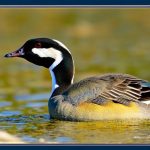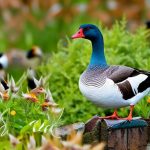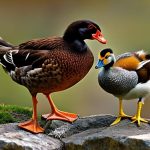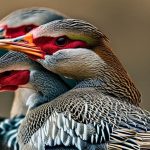Geese can be a beautiful sight to behold, with their graceful flight and elegant presence. However, when they start invading your lawn, they can quickly become a nuisance. Geese are attracted to lawns for various reasons, and their presence can have a negative impact on your property. In this article, we will explore the reasons why geese are attracted to lawns, the damage they can cause, and effective methods to keep them off your property.
Key Takeaways
- Geese can cause damage to your lawn and pose health risks to humans.
- Geese are attracted to lawns because they provide easy access to food and water.
- Geese can leave behind droppings that are difficult to clean and can damage grass.
- Natural ways to discourage geese include planting unappealing vegetation and using noise deterrents.
- Physical barriers such as fences and netting can be effective in keeping geese away.
Understanding why geese are attracted to your lawn
Geese are attracted to lawns for several reasons. Firstly, lawns provide an open space for geese to graze on grass and other vegetation. They are herbivores and rely on grass as their primary food source. Lawns also provide easy access to water sources such as ponds or lakes, which geese need for drinking and bathing. Additionally, lawns often offer a clear line of sight, allowing geese to spot potential predators from a distance.
However, the behavior of geese can be problematic when they invade your lawn. They are known to leave behind droppings that can cover your lawn and create an unsightly mess. Geese also have a tendency to aggressively defend their territory, which can be intimidating and even dangerous for humans and pets. Their constant presence can also lead to soil compaction and damage to plants and landscaping features.
The negative impact of geese on your lawn
The presence of geese on your lawn can have several negative impacts. Firstly, their droppings can create an unsightly mess that is difficult to clean up. Not only does this affect the aesthetic appeal of your property, but it can also create an unhygienic environment. Geese droppings contain high levels of bacteria, including E.coli and salmonella, which can pose health risks to humans and pets.
In addition to the mess they leave behind, geese can also cause damage to your lawn. Their constant grazing can lead to overgrazing, which can result in bare patches and thinning of the grass. Geese also have a habit of pulling up grass and plants while foraging for food, which can further damage your lawn. Their presence can also lead to soil compaction, making it difficult for grass and other plants to grow.
Natural ways to discourage geese from your lawn
If you want to keep geese off your lawn, there are several natural methods you can try. Firstly, you can make your lawn less attractive to geese by reducing the amount of open space available to them. Planting shrubs or tall grasses around the perimeter of your lawn can create a barrier that geese are less likely to cross. You can also create obstacles such as rocks or logs to make it more difficult for geese to access your lawn.
Another natural deterrent is the use of certain plants that geese find unappealing. Geese are known to avoid areas with tall, dense vegetation. Planting tall grasses or native plants that have a strong scent or taste can help deter geese from your lawn. Additionally, you can try using natural repellents such as garlic or chili pepper spray, which can be sprayed on the grass to make it less appealing to geese.
Using physical barriers to keep geese away
Physical barriers can be an effective way to keep geese off your lawn. There are several options available, each with its own pros and cons. One option is the use of fencing or netting. This can be installed around the perimeter of your lawn to create a physical barrier that geese cannot easily cross. However, it is important to ensure that the fencing is tall enough and properly secured to prevent geese from flying over or crawling under.
Another option is the use of floating barriers in water sources such as ponds or lakes. These barriers create a physical barrier that prevents geese from accessing the water. They can be made of materials such as floating ropes or buoys, and are often effective in deterring geese. However, it is important to regularly check and maintain these barriers to ensure their effectiveness.
Creating an uninviting environment for geese

In addition to physical barriers, you can also make your property less appealing to geese by creating an uninviting environment. One way to do this is by removing any potential food sources. Geese are attracted to lawns that offer easy access to grass and other vegetation. By regularly mowing your lawn and removing fallen fruits or seeds, you can reduce the availability of food for geese.
Landscaping can also play a role in deterring geese. Geese prefer open spaces with a clear line of sight, so planting tall shrubs or trees can create obstacles that geese are less likely to cross. Additionally, you can create areas of dense vegetation or install rocks or gravel in certain areas to make it less appealing for geese to land or walk on.
Using decoys to deter geese from your lawn
Decoys can be an effective way to deter geese from your lawn. There are several types of decoys available, each with its own pros and cons. One option is the use of predator decoys, such as plastic owls or coyotes. These decoys mimic natural predators of geese and can help deter them from your lawn. However, it is important to regularly move the decoys around to prevent geese from becoming accustomed to them.
Another option is the use of motion-activated decoys. These decoys are equipped with sensors that detect movement and emit sounds or spray water when triggered. The sudden movement and noise can startle geese and discourage them from landing or staying on your lawn. However, it is important to regularly check and maintain these decoys to ensure their effectiveness.
The benefits of using trained dogs to keep geese away
Trained dogs can be a highly effective method for keeping geese away from your lawn. Dogs have a natural instinct to chase and herd animals, and their presence alone can be enough to deter geese. However, it is important to note that not all dogs are suitable for this task. Certain breeds, such as Border Collies or Australian Shepherds, are known for their herding abilities and are often used to manage geese.
Using trained dogs to keep geese away has several benefits. Firstly, it is a natural and non-harmful method that does not rely on chemicals or physical barriers. Secondly, it is a highly effective method, as the presence of a dog can create a strong deterrent for geese. Lastly, it is a versatile method that can be used in various settings, including residential properties, parks, and golf courses.
Legal ways to manage geese on your property
When managing geese on your property, it is important to follow local regulations and laws. In many areas, geese are protected under wildlife conservation laws, and it is illegal to harm or kill them without proper permits. However, there are legal options available for managing geese. These include the use of non-lethal deterrents such as physical barriers, decoys, or trained dogs.
If you are experiencing a significant problem with geese on your property, it is recommended to contact your local wildlife or environmental agency for guidance. They can provide information on the specific regulations in your area and offer advice on the best methods for managing geese without violating any laws.
Conclusion and summary of effective methods to keep geese off your lawn
In conclusion, geese can be a nuisance when they invade your lawn. They are attracted to lawns for various reasons, and their presence can have a negative impact on your property. However, there are several effective methods to keep geese off your lawn.
Natural methods include making your lawn less attractive to geese by reducing open space and using natural deterrents such as plants or repellents. Physical barriers such as fencing or floating barriers can also be effective in keeping geese away. Creating an uninviting environment through landscaping can further deter geese from your property.
Decoys and trained dogs are also effective methods for managing geese. Decoys mimic natural predators or use motion-activated features to startle geese. Trained dogs have a natural instinct to chase and herd animals, making them highly effective in deterring geese.
It is important to follow local regulations and laws when managing geese on your property. Geese are often protected under wildlife conservation laws, and it is illegal to harm or kill them without proper permits. By using legal and non-lethal methods, you can effectively manage geese and keep them off your lawn.
If you’re looking for effective ways to keep geese off your lawn, you might also be interested in learning about the importance of chicken coop door size. Poultry Wizard offers a helpful article on how to determine the ideal door size for your chicken coop, which can play a crucial role in keeping unwanted visitors like geese out. Understanding the right dimensions for your coop’s entrance can help ensure that only your feathered friends have access to their cozy home. Check out the article here for more information on this essential aspect of poultry care.
FAQs
What are some effective ways to keep geese off my lawn?
There are several effective ways to keep geese off your lawn, including using decoys, installing fencing, using repellents, and modifying the landscape.
What kind of decoys can I use to keep geese away?
You can use decoys such as fake predators, such as coyotes or owls, or even fake geese to deter real geese from landing on your lawn.
What kind of fencing is best for keeping geese off my lawn?
A fence that is at least 3-4 feet tall and has small mesh or wire spacing is best for keeping geese off your lawn. Electric fencing can also be effective.
What kind of repellents can I use to keep geese away?
There are several types of repellents that can be used to keep geese away, including visual repellents, such as reflective tape or balloons, and auditory repellents, such as loud noises or distress calls.
How can I modify my landscape to keep geese off my lawn?
Modifying your landscape can include removing any standing water or food sources, planting tall grasses or shrubs to create a barrier, or installing a pond aerator to discourage geese from landing in your pond.
Meet Walter, the feathered-friend fanatic of Florida! Nestled in the sunshine state, Walter struts through life with his feathered companions, clucking his way to happiness. With a coop that’s fancier than a five-star hotel, he’s the Don Juan of the chicken world. When he’s not teaching his hens to do the cha-cha, you’ll find him in a heated debate with his prized rooster, Sir Clucks-a-Lot. Walter’s poultry passion is no yolk; he’s the sunny-side-up guy you never knew you needed in your flock of friends!







